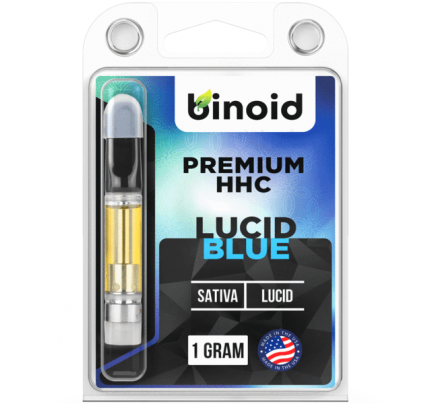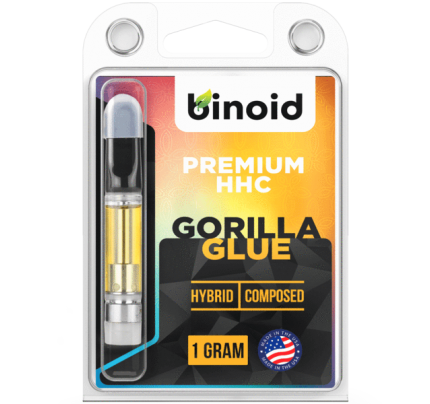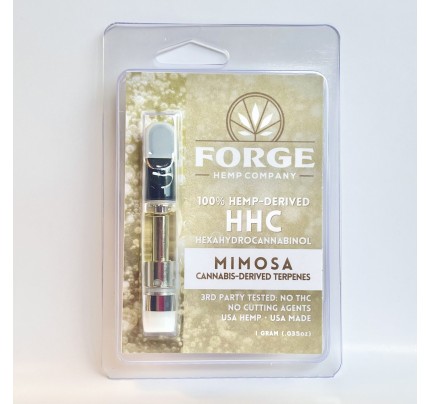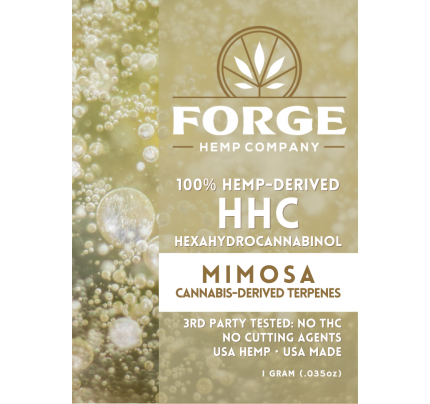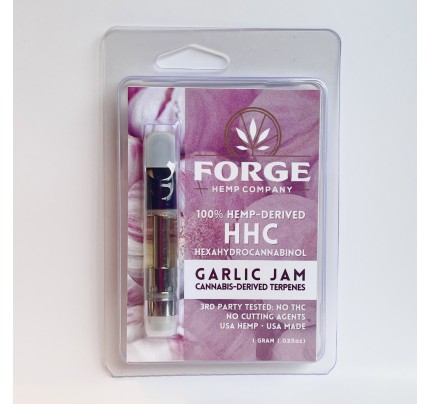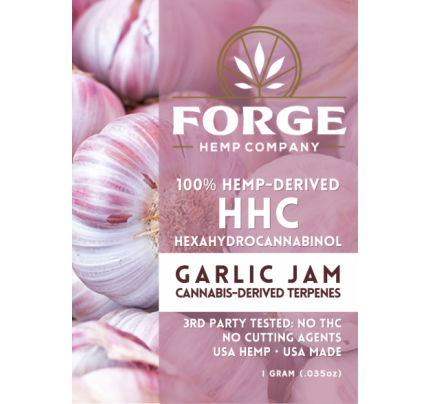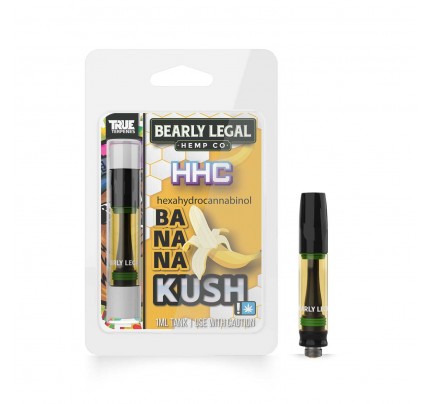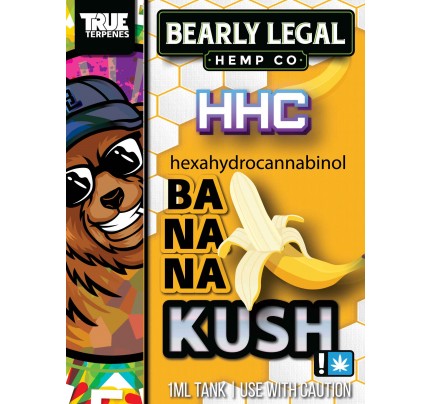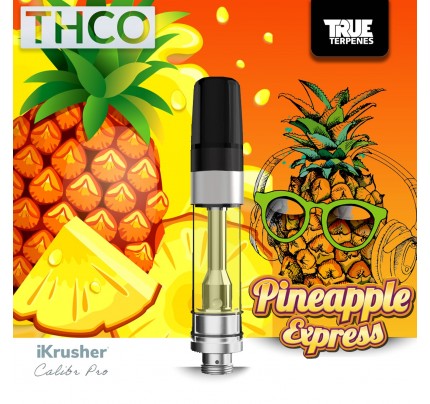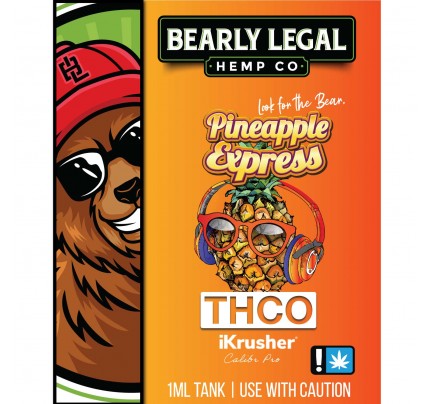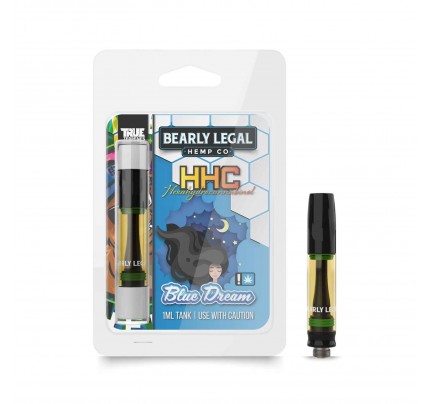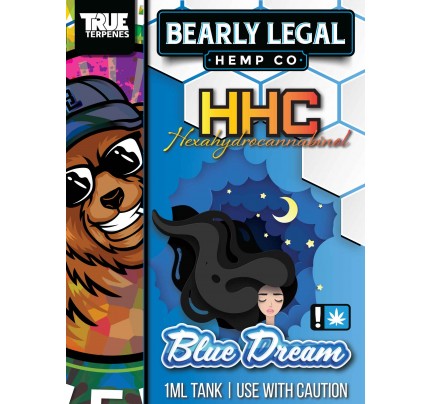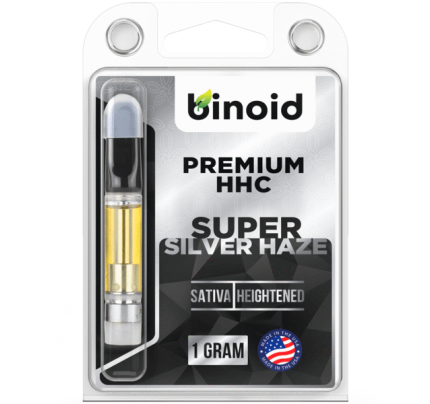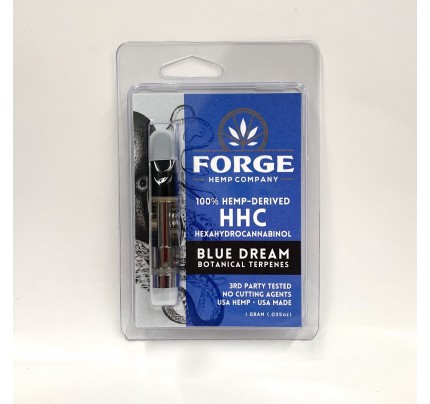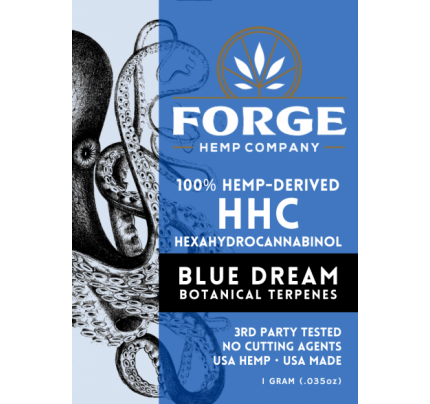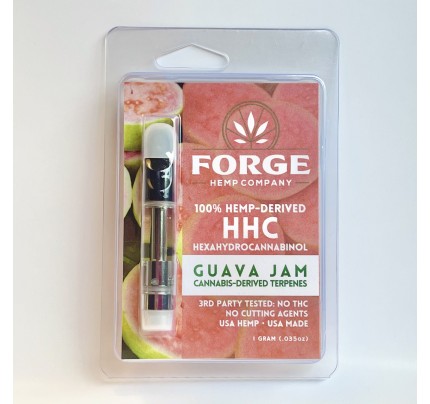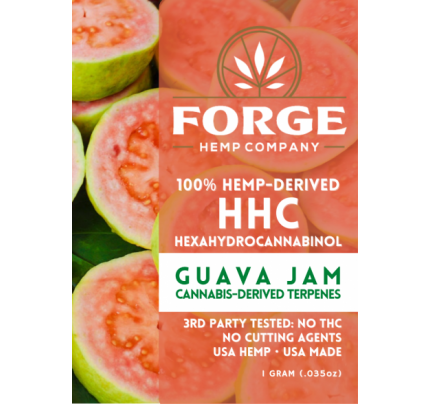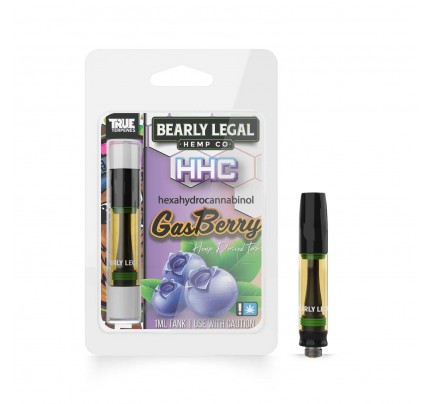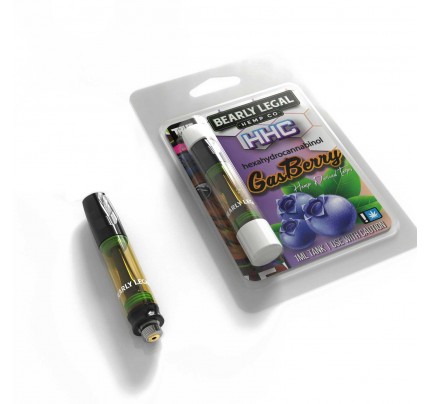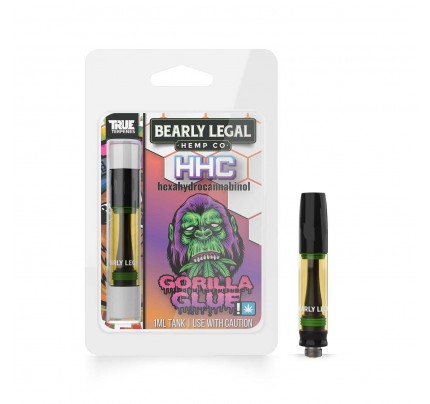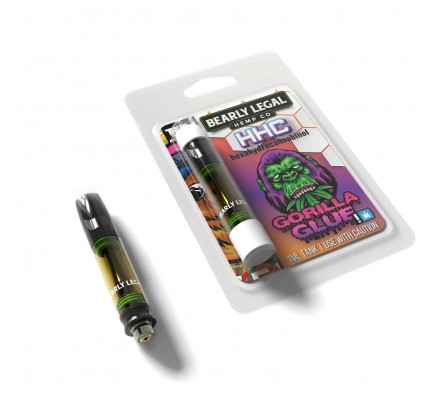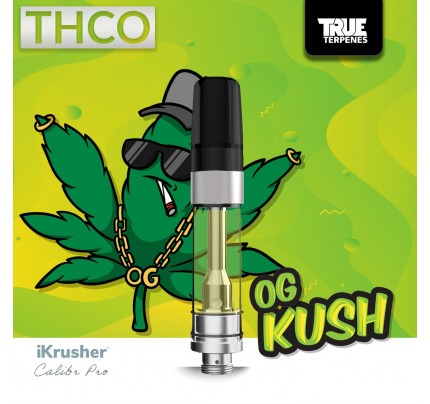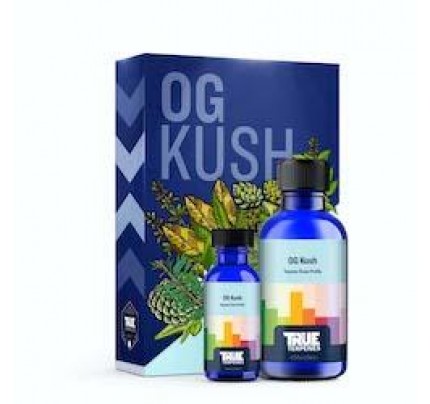Product Description
FORGE HEMP BLUE DREAM HHC HEXAHYDROCANNABINOL VAPE CARTRIDGE - BOTANICAL TERPENES
Blue Dream HHC Vape Carts by Forge Hemp contain 100% Hemp-Derived HHC (HEXAHYDROCANNABINOL) Distillate & Botanical Terpenes. HHC is a naturally occurring hemp-derived cannabinoid that does not fall under any state restrictions like Delta-8 THC does, including states with the most stringent laws. It is psycho-active, non-THC, and its effects are very similar to Delta-9 THC. HHC is one of many known cannabinoids (like CBD, CBN, CBG, THC, etc.) found naturally in the hemp plant. HHC is rare because it is not Tetrahydrocannabinol (THC), but produces a similar sensation.
Blue Dream Details: Blue Dream is a Sativa-Dominant Hybrid marijuana strain made by crossing Blueberry with Haze. This strain produces a balanced high, along with effects such as euphoric, creative, cerebral stimulation and full-body relaxation. Blue Dream's flavor, smells and taste like sweet berries. Users often use Blue Dream to treat symptoms of depression, chronic pain and nausea. Blue Dream originated in California and has since achieved legendary status among West Coast strains and has quickly become one of the most searched for strains.
HHC Hemp-Derived Cartridge Details:
- Premium Botanical Terpenes
- Half-Gram Cartridge
- Pure Hemp-Derived HHC (Hexahydrocannabinol) Distillate
- Sativa Dominant
- Flavor: Sweet, Juicy Blueberries, Earth
- Effects: Euphoric, Energizing, Creative, The Most Popular Strain For Elevating One’s Feelings
- No VG, PG, PEG, Vitamin E, MCT, or any other cutting agents, only Pure and very Concentrated Distillate
- Third Party Tested
SUGGESTED USE: Start with one puff and wait 15-30 minutes. Store away from heat and direct sunlight.
About Forge Hemp Co.
Forge Hemp Company is a Denver-based boutique brand of high-strength CBD, Delta-8 THC, HHC and CBN products. All Forge Hemp products clearly show the amount of Cannabidiol (CBD), Cannabinol (CBN), and Delta-8 per ounce and/or serving and are third-party lab tested for purity and potency. All of their CBD comes from Colorado-grown hemp, never foreign hemp or synthetic manufacturing. They source their ingredients and materials from trusted, reputable partners to achieve consistent quality and safety.
What are Botanical Terpenes?
Botanical Terpenes are terpenes extracted from non-cannabis plant sources. The term “Botanical Terpenes” is usually used interchangeably with the term “Plant-Derived Terpenes.” Cannabis-Derived Terpenes retain their marijuana taste, however, Botanical Terpenes offer a variety of flavors and aromas that can be different from cannabis. Botanical-Derived Terpenes can activate the entourage effect in a similar way as Cannabis-Derived Terpenes, and they help the HCC cannabinoids work better after consumption. Botanical Terpenes are terpene isolates extracted from legal plants such as citrus, cloves lavender and pine needles. While many hemp terpenes extracts are harvested from only one plant, the Botanical Terpene process can use any number of different plants as the terpene source. Once extracted, the terpenes can be optimized and used for their health benefits, calming and soothing effects, and pungent smells. Some of the most common Botanical Terpene Extracts are myrcene, alpha-pinene, linalool, and limonene. Forge's Hemp HCC Botanical Terpenes and 100% hemp-derived HHC (HEXAHYDROCANNABINOL) distillate cartridges are among the most potent, best quality and best tasting HHC Carts in the market.
What Is HHC Cannabinoid?
HHC is short for Hexahydrocannabinoid. HHC is a cannabinoid that is naturally found in the seeds and pollen of a hemp plant, It is non-psychoactive and contains no THC, but still contains cannabinoids, such as THC does and has similar potency and effects. Some people claim it gives them the same euphoric feeling, pain-fighting, and anti nausea/vomiting effects that THC does. Most users just enjoy the more happy, mellow and uplifting Buzz.
Hexahydrocannabinoid is a semi-synthetic cannabinoid Derivative, an isomer of THC. HHC effects are very similar to THC, but HHC does have some differences. This type of structure means that the HHC molecule has a minor difference from the one of THC. The difference is in one of the double carbon bonds of THC that breaks during the hydrogenation process to result in HHC. HHC does not occur in nature, it’s a hydrogenated form of a cannabinoid, which is achieved using a specialized process, by sealing the cannabinoid in a pressurized container with hydrogen gas (H2). The hydrogen reacts with the target molecule by breaking the double bonds of carbon atoms and leaving them as single bonds. The process may dramatically change the way in which cannabinoids interact with the human body, in a great way.
HHC binds to both CB1 and CB2 receptors in a very tight bind, which means it’s a potent cannabinoid both in Vivo (medical study or experiment in a living organism) and in Vitro (medical study or experiment in a laboratory).
HHC has 3 forms, scientists call these different forms “chiral centers”, they are essentially exact replicas of each other, and they’re called enantiomers. These different forms have varied effects of the human body, all depending on which chiral center they bind to.
- Chiral center number 1 – is called C1 – if the HHC binds to this chiral, it will activate the CB1 receptor.
- Chiral center number 2 – is called C2 – if the HHC binds to this chiral, it will activate the CB2 receptor.
- Chiral center number 3 – is called C3 – if the HHC binds to this chiral, it won’t activate either the CB1 or CB2 receptor.
The differences between the three enantiomers of HHC are important because they show that HHC can bind to two different receptors (CB1 and CB2), however it can only activate CB1 and CB2 one at a time. This means HHC is potentially a compound that can treat two conditions at once, it can heal conditions related to CNS (Central Nervous System), such as Epilepsy, Bell's Palsy, Alzheimer's Disease, Cerebral Palsy, Parkinson's Disease and Multiple Sclerosis (MS). HCC could also potentially treat immune related conditions as well as cardiometabolic disorders.
HHC Cannabinoid Effects
HHC effects are very very similar to THC, but HHC does have some differences. Some users claim it gives them sensory enhancement, tingling in their limbs, visual and hearing alteration, pain-fighting, improves athletic performance, euphoric feeling and anti-nausea/vomiting effects that THC does. It causes a gradual increase in mood and a deep, relaxing sense of well-being for many people. The High of HHC can last about two to three hours. The psychotropic effect of the “high” is the most distinctive effect of THC, however there are many other effects of THC in the body, most of them beneficial.
This substance shows remarkable efficacy as a appetite regulator, anxiety suppressant, pain reliever and very promising glaucoma treatment. The effects of HHC are also stronger for medical conditions like inflammation and pain, than they are with THC that hasn't been hydrogenated. HHC anti-tumor properties, are also more effective than the ones from regular THC. Some studies, show hydrogenated cannabinoids are much more effective than natural ones for the treatment of tumors. Laboratory results show that tumors treated with hydrogenated cannabinoids reduce their size more then tumors treated with natural cannabinoids. While other effects are yet unknown, these results are promising for their application in medicine.
Will HHC (Hexahydrocannabinol) Show Up On A Drug Test?
There’s some indication the HHC compound doesn’t metabolize into 11-hydroxy-THC, which is the primary metabolite of THC that can be detected in drug tests. This has a lot of people interested because the other THC alternatives, such as THC-O, Delta-8 and Delta 10 THC, will contribute to a failure on blood tests or urine tests for THC. This is only a theory and has not yet been tested to prove whether it’s true or not. Whether HHC can truly avoid drug tests or not is still up for question. If you are worried about failing a drug test, we suggest waiting till more information is known about Hexahydrocannabinol and drug tests.
What Are The Side Effects of Hexahydrocannabinol (HHC)?
The popularity of HHC is on the rise, and a lot of people are already using it on a daily basis. There has not yet been any reports of severe side effects with HHC. Preliminary research suggests it shares a comparable safety profile to THC. There are some side effects that have been reported. These effects are similar to the side effects experienced with THC when taken at a high dose.
- Anxiety
- Insomnia
- Rapid heart rate
- Dizziness & confusion
- Increased hunger levels
- Headache
- Strong mental and physical experience
- Dry mouth
- Red eyes
- Paranoia
- Dry Mouth
Taking too much can cause intense side effects, as would overindulging in any other psychoactive compound. Ingesting smaller dosages to begin is advised.
WARNING: KEEP AWAY FROM CHILDREN. Do not use if pregnant or nursing. This product may affect blood pressure, heart rate and/or intraocular pressure in some people. Consult a physician if you have any known or unknown health conditions including heart, blood pressure, eye, eye pressure or similar related issues prior to use.
HHC Hexahydrocannabinol is derived from 100% legal USA hemp in accordance with the 2018 Farm Bill. The Farm Bill legally defines hemp as all parts of cannabis plants (that contain less than 0.3% Delta-9 THC), including isomers and derivatives. Delta-8 is both an isomer and a derivative. HHC is not a specific type of cannabinoid, but rather the result of a chemical process applied to existing cannabinoids that are already protected under federal law. The purchaser assumes all liabilities pertaining to whether this product is legal in their state or territory. Do not use this product if you undergo drug screening as you will likely fail the drug test. This product has not been evaluated by the FDA and is not intended to diagnose, treat, cure or prevent any disease or medical condition.

